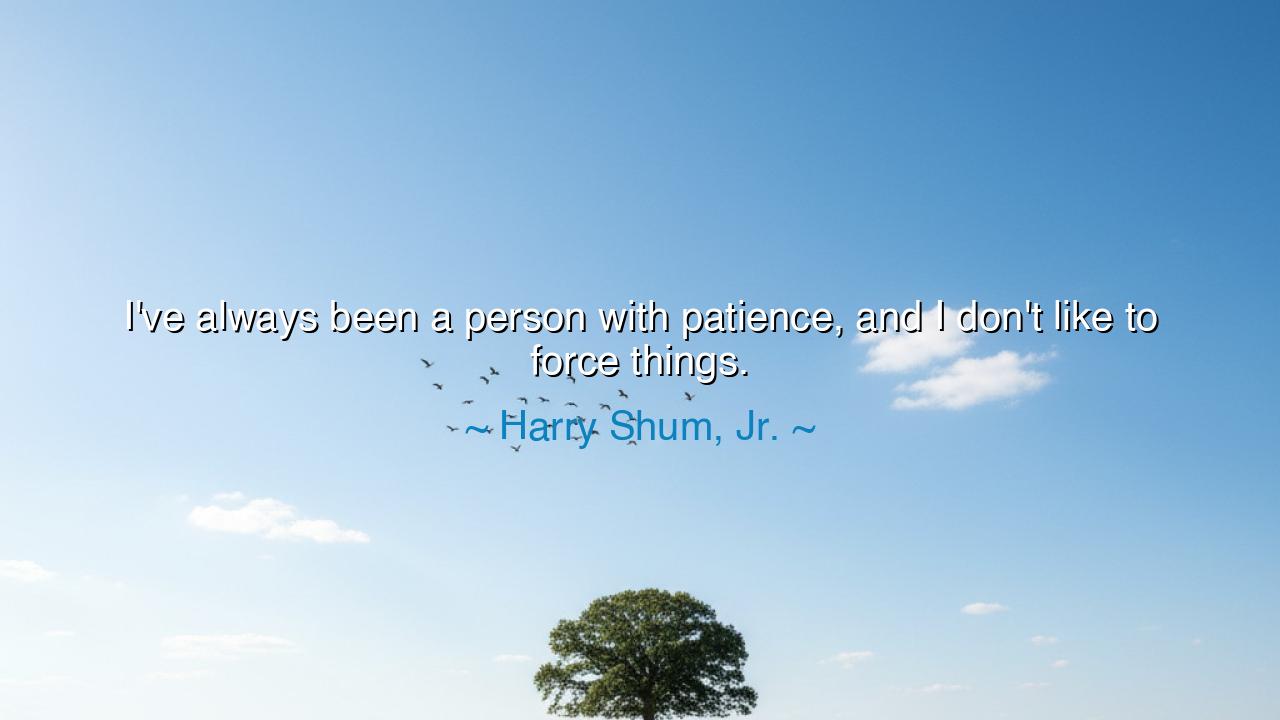
I've always been a person with patience, and I don't like to






Harry Shum, Jr., a man of discipline in dance and of grace in performance, once declared: “I’ve always been a person with patience, and I don’t like to force things.” Though simple, these words carry the weight of timeless wisdom. They speak of the power of patience, that quiet virtue which so often outshines ambition, and of the futility of forcing what is not yet ready to bloom. In them is a reminder that life’s greatest fruits are harvested not by rushing, but by waiting, nurturing, and allowing destiny to unfold in its own season.
The ancients knew that forcing things often leads to ruin. Just as a farmer cannot hasten the growth of wheat by tugging at its shoots, so too a person cannot bring forth harmony by pushing against the natural rhythm of life. Shum’s words echo this eternal law: that wisdom lies not in straining, but in aligning oneself with the flow of time. Patience is not passive, but an active strength—the strength to endure the silence before the song, to hold steady before the storm breaks, to trust that what is meant to come will come.
Consider the tale of Marcus Aurelius, emperor and philosopher. Surrounded by war, betrayal, and the weight of empire, he wrote in his meditations of the necessity of patience, of not forcing the world to bend to his will, but of bending his spirit to endure the world as it was. His reign is remembered as noble not because he conquered everything before him, but because he understood the harmony between action and restraint. Harry Shum’s declaration breathes the same spirit: the recognition that pressing too hard breaks more than it builds.
Patience, however, does not mean idleness. Shum himself, as a dancer and actor, embodies discipline, training tirelessly for his craft. But he shows that discipline is not the same as force. Discipline is preparation; force is desperation. One cultivates readiness so that when the moment arrives, the body and spirit are prepared to meet it. The other seeks to drag the moment forward before its time, and in doing so, often destroys it. His words are a call to embrace readiness while rejecting impatience.
History also gives us the parable of Mahatma Gandhi. In the struggle for India’s independence, he chose not the path of violence, but the path of patience. He refused to force the liberation of his people through blood and fire, but instead endured with nonviolent resistance, trusting that time and truth would prevail. His patience seemed weak to some, but in the end, it became the most powerful force of all, outlasting the might of an empire. Here we see how patience, far from being soft, can become the weapon of the strong.
The lesson for us is this: in your endeavors, cultivate patience as both shield and guide. Do not force relationships, for they will break under pressure. Do not force success, for it will crumble without foundation. Do not force art, for it will ring hollow without authenticity. Instead, prepare, endure, and trust the rhythm of life. Work faithfully, but leave room for grace, for timing, for the mystery that we cannot command.
Therefore, O seeker of balance, take Shum’s words into your heart. Be patient. Do not force. Instead, align yourself with preparation and trust. Water your field, but do not pull your crops. Sharpen your tools, but do not demand the stone break before its time. In this way, you will find that life, when not forced, often gives more than you ever thought to demand. And when your moment arrives, as it surely will, you shall be ready—calm, steady, and triumphant.






AAdministratorAdministrator
Welcome, honored guests. Please leave a comment, we will respond soon